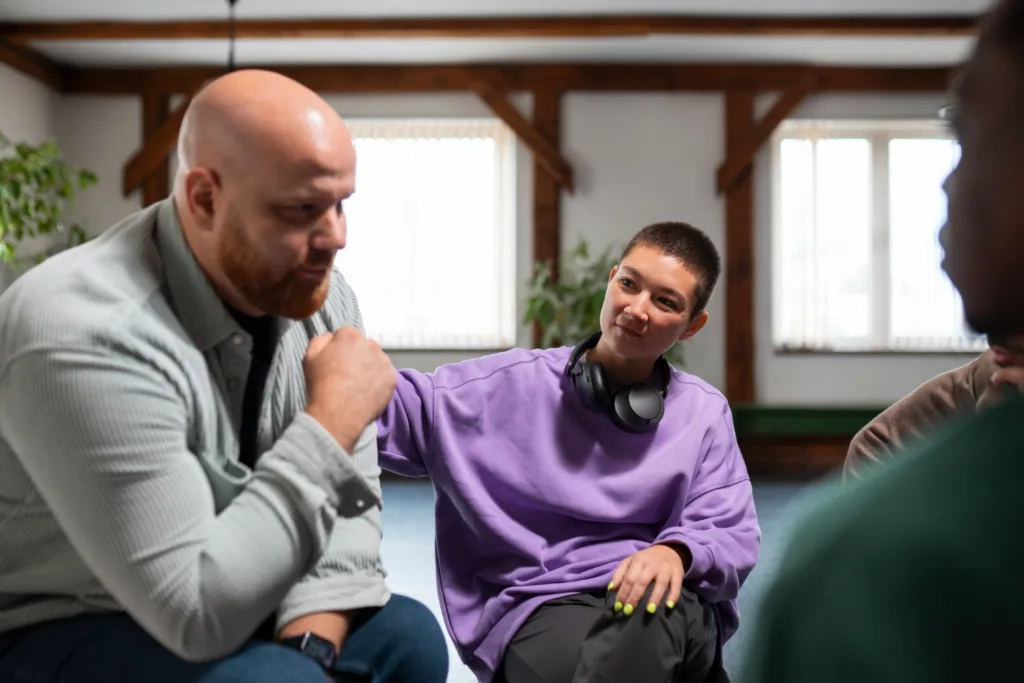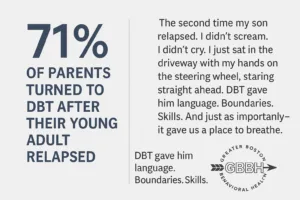The second time my son relapsed, I didn’t scream. I didn’t cry. I just sat in the driveway with my hands on the steering wheel, staring straight ahead. Not because I didn’t care—but because I didn’t know what else to do.
We’d already been through it once. The denial, the drama, the rehab, the return. And for a while, things got better. He moved out. Got a job. Called once a week. I told myself he was stable. I wanted to believe we were on the other side of it.
But relapse doesn’t always come with sirens. Sometimes it’s quiet. Missed messages. A fog in their voice. A story that doesn’t quite add up. Until one day, it’s undeniable.
If you’re reading this because your son or daughter is using again, let me say this first: you are not a bad parent. You’re a parent in pain. And you’re doing the brave thing by trying to find out what now.
For us, “what now” was DBT—Dialectical Behavior Therapy. And even though it didn’t fix everything overnight, it gave us something we hadn’t had in a long time: a place to start healing as a family.
What Is DBT, and Why Does It Work?
Dialectical Behavior Therapy is a structured, skills-based therapy that helps people manage overwhelming emotions and self-destructive behaviors.
Originally developed for people with borderline personality disorder and chronic suicidality, DBT is now widely used to treat:
- Substance use
- Emotional dysregulation
- Depression and anxiety
- Self-harm
- Impulsivity and aggression
- Post-relapse behavior cycles
What makes DBT different is that it doesn’t just help someone stop harmful behavior—it teaches them how to live differently.
DBT combines mindfulness with real-life skills for emotion regulation, distress tolerance, interpersonal effectiveness, and self-acceptance. It’s not vague. It’s not wishy-washy. It’s actionable.
And for my son? It worked in ways previous therapies hadn’t.
Why We Turned to DBT After the Relapse
By the time we found Greater Boston Behavioral Health, we were past the panic stage. Past the yelling. Past the empty threats.
We were just tired.
He was tired of disappointing us. We were tired of walking on eggshells. Nobody wanted a repeat of the last crash.
That’s when a friend—another parent—mentioned DBT. She said her daughter, also 20, was finally showing up differently in therapy. She used the word “anchored.” And that word hit me in the gut. That’s what I wanted. Not a perfect kid. Just someone anchored enough to stay present in their own life.
DBT gave him language. Boundaries. Skills. And just as importantly—it gave us a place to breathe.
DBT Helped My Son Learn to Pause Instead of Escape
Before DBT, my son had one coping mechanism: escape. That looked like using, isolating, or getting angry enough to push everyone away.
He wasn’t mean. He was afraid. DBT didn’t ask him to explain everything. It helped him feel safe enough to stay in the room.
Here’s what I watched him learn to do:
- Notice when emotions were rising—before they took over
- Text his therapist instead of disappearing for a weekend
- Say, “I’m overwhelmed,” without punching walls or ghosting friends
- Breathe through cravings instead of drowning them
He didn’t become a different person. He became a more present one.
One night, he came over for dinner and actually stayed. No drama. No tension. Just sat at the table, talked to his sister, helped load the dishwasher. That felt like a miracle.
DBT Helped Me Let Go of the Fix-It Mentality
As a parent, it’s almost impossible not to jump into fixer mode. Especially when your child is spiraling.
I’d spent years offering solutions, asking the right questions, researching everything. But DBT taught me something I didn’t expect: Sometimes the most loving thing you can do is not fix it.
Through family education and coaching, I learned how to:
- Validate my son’s experience without rescuing
- Say “I believe in you” instead of “You should…”
- Set boundaries I could actually enforce
- Take care of my nervous system—even when his was overloaded
I started showing up differently. Not as a manager, not as a savior—just as his mom. And that helped him start trusting me again.
DBT Rebuilt a Communication Bridge We Thought Was Gone
Addiction isolates everyone. Not just the person using. It breaks trust, burns time, and leaves relationships raw.
After the relapse, we barely spoke. When we did, it was mostly logistics or silence. But DBT gave us a shared vocabulary.
Instead of “What’s wrong with you?” I could ask, “Do you need space or support right now?”
Instead of him storming off, he could say, “I can’t talk yet, but I’m not shutting down.”
Instead of holding everything in, I could say, “That scared me. I’m trying not to overreact.”
DBT didn’t give us peace overnight. But it gave us tools—and that made space for trust to grow again.
You Don’t Have to Be in Crisis to Start DBT
This might be the most important thing I learned: you don’t have to wait until the next collapse to get support.
We didn’t wait for rock bottom. We reached out when things were fragile. And that made a huge difference.
The team at Greater Boston Behavioral Health didn’t treat us like we were broken. They treated us like a family in transition—and gave us the structure we didn’t know we needed.
If you’re looking for DBT in Boston, MA, or if you’re just holding your breath every time your child leaves the house, this might be your place to exhale. And for those in Needham, Waltham, or Newton, we have nearby locations to make care accessible.
FAQs: DBT for Parents After a Young Adult’s Relapse
My child doesn’t think they need therapy. Will DBT still help?
Yes. Many young adults come into DBT skeptical or resistant. The structured, skill-based approach often helps them feel less judged—and more willing to engage over time.
Is DBT only for addiction?
Not at all. While it’s incredibly effective for relapse prevention, DBT also helps with anxiety, depression, emotional dysregulation, self-harm, and family conflict.
Can parents be involved?
Absolutely. At Greater Boston Behavioral Health, we offer parent coaching and family education alongside our DBT program. This isn’t about blame—it’s about healing together.
What makes DBT different from regular therapy?
DBT is highly structured, with clear goals and skill development. It teaches practical tools for handling emotional storms and building healthier relationships—both with yourself and others.
How long does DBT take?
Most DBT programs run for 6 months to a year. Many clients start noticing changes within the first 8–12 weeks as they build consistency and confidence in their new skills.
Is it too late if my child has relapsed multiple times?
It’s never too late. Relapse is painful, but it’s not the end of the story. DBT can offer new hope even when other approaches haven’t worked.
Call (888) 450-3097 to learn more about our DBT services in Boston, Massachusetts. You don’t have to carry this alone anymore.


